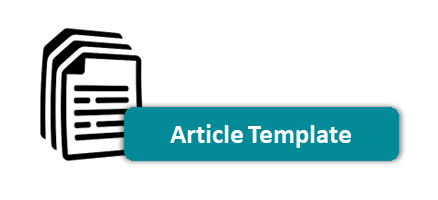PILIHAN KARIER DAN KELUARGA PADA WANITA: STUDI KORELASI DUKUNGAN SOSIAL DAN WORK LIFE BALANCE
Abstract
Penelitian ini bertujuan untuk mengetahui hubungan antara dukungan sosial dengan work life balance pada perempuan bekerja yang sudah menikah. Hipotesis yang diajukan adalah ada hubungan positif antara dukungan sosial dengan dengan work life balance pada perempuan bekerja yang sudah menikah. Subjek dalam penelitian ini adalah perempuan bekerja yang sudah menikah dengan jumlah 70 orang. Pengambilan data menggunakan skala work life balance dan skala dukungan sosial dan dilakukan secara online dengan google form yang didistribusikan kepada perempuan bekerja yang sudah menikah. Metode analisis yang digunakan adalah korelasi product moment yang dikembangan oleh Karl Pearson dengan menggunakan software analisis data JASP versi 16.2.0. Berdasarkan hasil analisis data diperoleh koefisien korelasi r sebesar 0,549 dengan (p < 0,001). Hasil tersebut menunjukkan adanya hubungan positif yang signifikan antara dukungan sosial dengan work life balance pada perempuan bekerja yang sudah menikah sehingga bisa disimpulkan bahwa hipotesis penelitian ini diterima. Hubungan positif tersebut bisa diartikan bahwa semakin tinggi dukungan sosial maka akan semakin tinggi work life balance pada perempuan bekerja yang sudah menikah. Sebaliknya, semakin rendah dukungan sosial semakin rendah work life balance pada perempuan bekerja yang sudah menikah. Besarnya sumbangan dukungan sosial terhadap work life balance yaitu sebesar 30,14% sedangkan sisanya 69,86% dipengaruhi oleh variabel lain.
References
Abendroth, A. K., & Dulk, L. den. (2011). Support for the work-life balance in europe: The impact of state, workplace and family support on work-life balance satisfaction. Work, Employment and Society, 25(2), 234–256. https://doi.org/10.1177/0950017011398892
Abioro, M. A., Oladejo, D. A., & Ashohbon, F. O. (2018). Work life balance practices and employees productivity in the Nigerian University system. Crawford Journal of Business & Social Sciences, 8(2), 49–59.
Bulger, C. A., & Fisher, G. G. (2012). Ethical imperatives of work/life balance. Work and Quality of Life: Ethical Practices in Organizations, 181–201. https://doi.org/10.1007/978-94-007-4059-4_10
Byron, K. (2005). A meta-analytic review of work-family conflict and its antecedents. Journal of Vocational Behavior, 67(2), 169–198. https://doi.org/10.1016/J.JVB.2004.08.009
Fisher, G. G., Bulger, C. A., & Smith, C. S. (2009). Beyond work and family: A measure of work/nonwork Interference and enhancement. Journal of Occupational Health Psychology, 14(4), 441–456. https://doi.org/10.1037/A0016737
Ford, M. T., Heinen, B. A., & Langkamer, K. L. (2007). Work and family satisfaction and conflict: A meta-analysis of cross-domain relations. Journal of Applied Psychology, 92(1), 57–80. https://doi.org/10.1037/0021-9010.92.1.57
Handayani, A. (2013). Keseimbangan kerja keluarga pada perempuan bekerja: Tinjauan teori border. Buletin Psikologi Universitas Gadjah Mada, 21(2), 90–101.
Jeyarathnam, M. (2017). Factors influencing work-life-balance of women professionals in It industry-A study in TamilNadu, India. International Journal of Humanities and Social Science Invention, 6(7), 26–33. www.ijhssi.org
Ojo, I. S., Falola, H. O., & Mordi, C. (2014). Work life balance policies and practices: A case study of nigerian female university students. European Journal of Business and Management, 6(12), 184–193. www.iiste.org
Othman, S. S. (2017). All about work-life balance. https://www.nst.com.my/news/2017/03/224357/all-about-work-life-balance
Santhi, T., & Sundar, D. K. (2012). A study on the work life balance of woman employees in information technology industry. ZENITH International Journal of Business Economics & Management Research, 2(1). www.zenithresearch.org.in
Sarafino, E. P., & Smith, T. W. (2011). Health psychology : Biopsychosocial Interactions 7 th Edition (7th ed.). John Wiley & Sons, Inc.
Tasnim, M., Hossain, M. Z., & Enam, F. (2017). Work-life balance: Reality check for the working women of bangladesh. Journal of Human Resource and Sustainability Studies, 5, 75–86. https://doi.org/10.4236/jhrss.2017.51008
Uddin, M., Ali, K. B., & Khan, M. A. (2020). Perceived Social Support (PSS) and Work-Life Balance (WLB) in a Developing Country: The Moderating Impact of Work-Life Policy. Iranian Journal of Management Studies, 13(4), 733–761. https://doi.org/10.22059/ijms.2020.282543.673663
Wong, P.-Y., Fatihah, N., Bandar, A., & Saili, J. (2017). Workplace factors and work life balance among employees in selected services. In International Journal of Business and Society (Vol. 18).
Published
Issue
Section
Copyright (c) 2022 Akhmad Dwi Haryrizki

This work is licensed under a Creative Commons Attribution-NonCommercial-NoDerivatives 4.0 International License.








